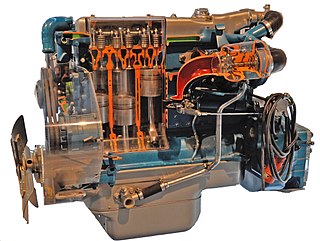
Fuel injection is the introduction of fuel in an internal combustion engine, most commonly automotive engines, by the means of an injector. This article focuses on fuel injection in reciprocating piston and Wankel rotary engines.

The Mercedes-Benz Group AG is a German multinational automotive corporation headquartered in Stuttgart, Baden-Württemberg, Germany. It is one of the world's leading car manufacturers. Daimler-Benz was formed with the merger of Benz & Cie., the world's oldest car company, and Daimler Motoren Gesellschaft in 1926. The company was renamed DaimlerChrysler upon the acquisition of American automobile manufacturer Chrysler Corporation in 1998, and was again renamed Daimler AG upon divestment of Chrysler in 2007. In 2021, Daimler AG was the second-largest German automaker and the sixth-largest worldwide by production. In February 2022, Daimler was renamed Mercedes-Benz Group as part of a transaction that spun-off its commercial vehicle segment as an independent company, Daimler Truck.

Wilhelm Maybach was an early German engine designer and industrialist. During the 1890s he was hailed in France, then the world centre for car production, as the "King of Designers".

Gottlieb Wilhelm Daimler was a German engineer, industrial designer and industrialist born in Schorndorf, in what is now Germany. He was a pioneer of internal-combustion engines and automobile development. He invented the high-speed liquid petroleum-fueled engine.

Ferdinand Anton Ernst Porsche, mainly known as Ferry Porsche, was an Austrian-German technical automobile designer and automaker-entrepreneur. He operated Porsche AG in Stuttgart, Germany. His father, Ferdinand Porsche Sr. was also a renowned automobile engineer and founder of Volkswagen and Porsche. His nephew, Ferdinand Piëch, was the longtime chairman of Volkswagen Group, and his son, Ferdinand Alexander Porsche, was involved in the design of the 911.

The Mercedes-Benz C-Class is a series of compact executive cars produced by Mercedes-Benz Group AG. Introduced in 1993 as a replacement for the 190 (W201) range, the C-Class was the smallest model in the marque's line-up until the W168 A-Class arrived in 1997. The C-Class has been available with a "4MATIC" four-wheel drive option since 2002. The third generation (W204) was launched in 2007 while the current W206 generation was launched in 2021.

The Mercedes-Benz E-Class is a range of executive cars manufactured by German automaker Mercedes-Benz in various engine and body configurations. Produced since September 1953, the E-Class falls as a midrange in the Mercedes line-up, and has been marketed worldwide across five generations.

The Mercedes-Benz CLK-Class is a former series of mid-size or entry-level luxury coupés and convertibles produced by Mercedes-Benz between 1996 and 2010. Although its design and styling was derived from the E-Class, the mechanical underpinnings were based on the smaller C-Class, and was positioned between the Mercedes-Benz SLK-Class and CL-Class. The name CLK is either derived from the German words "Coupé", "Luxus" (luxury) and "Kurz" (short) or "Coupé", "Leicht" (light) and "Kurz" (short), as the clear definition was never published. It primarily competes with the two-door BMW 3 and 6 Series, as well as the Audi A4 Cabriolet and Audi A5 Coupe/Cabriolet, as well as the Maserati Coupe and its convertible variant.

Gutbrod was a German manufacturer of cars, motorcycles and small agricultural machinery. The firm was founded in Ludwigsburg, Germany by Wilhelm Gutbrod in 1926. It originally built "Standard" branded motorcycles. In 1933 the company relocated to the nearby Stuttgart suburb of Feuerbach, and from 1933 to 1935, Standard Superior cars were built with rear-mounted engines.

Siegfried Samuel Marcus was a German inventor. Marcus was born in the Grand Duchy of Mecklenburg-Schwerin. He made the first petrol-powered vehicle in 1864, while living in Vienna, Austria.

The Otto engine is a large stationary single-cylinder internal combustion four-stroke engine, designed by the German Nicolaus Otto. It was a low-RPM machine, and only fired every other stroke due to the Otto cycle, also designed by Otto.

Daimler-Motoren-Gesellschaft was a German engineering company and later automobile manufacturer, in operation from 1890 until 1926. Founded by Gottlieb Daimler (1834–1900) and Wilhelm Maybach (1846–1929), it was based first in Cannstatt. Daimler died in 1900, and their business moved in 1903 to Stuttgart-Untertürkheim after the original factory was destroyed by fire, and again to Berlin in 1922. Other factories were located in Marienfelde and Sindelfingen.

The Mercedes-Benz OM 352 is a 5.7 litre inline-6 cylinder 4-stroke Diesel engine, made by Daimler-Benz.
Mercedes-Benz, commonly referred to as Mercedes and sometimes as Benz, is a German luxury and commercial vehicle automotive brand established in 1926. Mercedes-Benz AG is headquartered in Stuttgart, Baden-Württemberg, Germany. Mercedes-Benz AG produces consumer luxury vehicles and light commercial vehicles badged as Mercedes-Benz. From November 2019 onwards, Mercedes-Benz-badged heavy commercial vehicles are managed by Daimler Truck, a former part of the Mercedes-Benz Group turned into an independent company in late 2021. In 2018, Mercedes-Benz was the largest brand of premium vehicles in the world, having sold 2.31 million passenger cars.

Paul Daimler was a German mechanical engineer who designed automobiles. He was the eldest child of Gottlieb Daimler who founded Daimler-Motoren-Gesellschaft and invented the petrol engine.
Fritz Nallinger was a German automobile engineer and executive.

The Mercedes-Benz W02 was a midsize six-cylinder two-litre-engined automobile introduced by Daimler-Benz at the Berlin Motor Show in October 1926. It was developed in some haste under the manufacturer's Technical Director, Ferdinand Porsche in parallel with the smaller Mercedes-Benz W 01 and the larger three-litre-engined Mercedes-Benz W03 following the creation of Daimler-Benz, formally in July 1926, from the fusion of the Daimler and Benz & Cie auto-businesses.

The Gutbrod Superior is a small car, built from 1950 until 1954 by German manufacturer Gutbrod. A total of 6,860 cabriolet saloons and 866 estates were built in less than four years.
Josef Herbert Ernst Fiala is an Austrian automotive engineer.
Hans Nibel was a German mechanical engineer.















